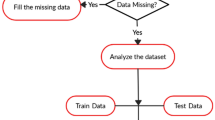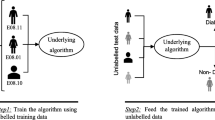Abstract
Detection of heart disease through early-stage symptoms is a great challenge in the current world scenario. If not diagnosed timely then this may become the cause of death. In developing countries where heart specialist doctors are not available in remote, semi-urban, and rural areas; an accurate decision support system can play a vital role in early-stage detection of heart disease. In this paper, the authors have proposed a hybrid decision support system that can assist in the early detection of heart disease based on the clinical parameters of the patient. Authors have used multivariate imputation by chained equations algorithm to handle the missing values. A hybridized feature selection algorithm combining the Genetic Algorithm (GA) and recursive feature elimination has been used for the selection of suitable features from the available dataset. Further for pre-processing of data, SMOTE (Synthetic Minority Oversampling Technique) and standard scalar methods have been used. In the last step of the development of the proposed hybrid system, authors have used support vector machine, naive bayes, logistic regression, random forest, and adaboost classifiers. It has been found that the system has given the most accurate results with random forest classifier. The proposed hybrid system was tested in the simulation environment developed using Python. It was tested on the Cleveland heart disease dataset available at UCI (University of California, Irvine) machine learning repository. It has achieved an accuracy of 86.6%, which is superior to some of the existing heart disease prediction systems found in the literature.


















Similar content being viewed by others
Availability of data and material
Not applicable.
References
Kumar R, Rani P (2020) Comparative analysis of decision support system for heart disease. Adv Math Sci J 9(6):3349–3356. https://doi.org/10.37418/amsj.9.6.15
Latha CBC, Jeeva SC (2019) Improving the accuracy of prediction of heart disease risk based on ensemble classification techniques. Inf Med Unlocked 16:100203. https://doi.org/10.1016/j.imu.2019.100203
Subhadra K, Vikas B (2019) Neural network based intelligent system for predicting heart disease. Int J Innov Technol Explor Eng 8(5):484–487
Jain A, Tiwari S, Sapra V (2019) Two-phase heart disease diagnosis system using deep learning. Int J Control Autom 12(5):558–573. http://sersc.org/journals/index.php/IJCA/article/view/2690
Coronato A (2018) Engineering high quality medical software: regulations, standards, methodologies and tools for certification. Inst Eng Technol. https://doi.org/10.1049/PBHE012E
Coronato A, Cuzzocrea A (2020) An innovative risk assessment methodology for medical information systems. IEEE Trans Knowl Data Eng 13(9):1–14. https://doi.org/10.1109/TKDE.2020.3023553
Sartori F, Melen R, Lombardi M, Maggiotto D (2019) Virtual round table knights for the treatment of chronic diseases. J Reliab Intell Environ 5(3):131–143. https://doi.org/10.1007/s40860-019-00089-8
Cicotti G (2017) An evidence-based risk-oriented V-model methodology to develop ambient intelligent medical software. J Reliab Intell Environ 3(1):41–53. https://doi.org/10.1007/s40860-017-0039-9
Vithanwattana N, Mapp G, George C (2017) Developing a comprehensive information security framework for mHealth: a detailed analysis. J Reliab Intell Environ 3(1):21–39. https://doi.org/10.1007/s40860-017-0038-x
Jusob FR, George C, Mapp G (2017) Exploring the need for a suitable privacy framework for mHealth when managing chronic diseases. J Reliab Intell Environ 3(4):243–256. https://doi.org/10.1007/s40860-017-0049-7
Ponikowski P, Anker SD, AlHabib KF, Cowie MR, Force TL, Hu S, Jaarsma T, Krum H, Rastogi V, Rohde LE, Samal UC, Shimokawa H, Siswanto BB, Sliwa K, Filippatos G (2014) Heart failure: preventing disease and death worldwide. ESC Heart Fail 1(1):4–25. https://doi.org/10.1002/ehf2.12005
Bashir S, Qamar U, Khan FH, Javed MY (2014) MV5: a clinical decision support framework for heart disease prediction using majority vote based classifier ensemble. Arab J Sci Eng 39(11):7771–7783. https://doi.org/10.1007/s13369-014-1315-0
Olaniyi EO, Oyedotun OK, Adnan K (2015) Heart diseases diagnosis using neural networks arbitration. Int J Intell Syst Appl 7(12):75–82. https://doi.org/10.5815/ijisa.2015.12.08
Verma L, Srivastava S, Negi PC (2016) A hybrid data mining model to predict coronary artery disease cases using non-invasive clinical data. J Med Syst 40(7):1–7. https://doi.org/10.1007/s10916-016-0536-z
Verma L, Srivastava S (2016) A data mining model for coronary artery disease detection using noninvasive clinical parameters. Indian J Sci Technol 9(48):1–6. https://doi.org/10.17485/ijst/2016/v9i48/105707
Miranda E, Irwansyah E, Amelga AY, Maribondang MM, Salim M (2016) Detection of cardiovascular disease risk’s level for adults using naive Bayes classifier. Healthc Inf Res 22(3):196–205. https://doi.org/10.4258/hir.2016.22.3.196
Wiharto W, Kusnanto H, Herianto H (2016) Interpretation of clinical data based on C4.5 algorithm for the diagnosis of coronary heart disease. Healthc Inf Res 22(3):186–195. https://doi.org/10.4258/hir.2016.22.3.186
Jabbar MA, Deekshatulu BL, Chandra P (2016) Prediction of heart disease using random forest and feature subset selection. In: Innovations in bio-inspired computing and applications. Springer, Cham, pp 187–196. https://doi.org/10.1007/978-3-319-28031-8_16
Kim JK, Kang S (2017) Neural network-based coronary heart disease risk prediction using feature correlation analysis. J Healthc Eng 2017:1–13. https://doi.org/10.1155/2017/2780501
Arabasadi Z, Alizadehsani R, Roshanzamir M, Moosaei H, Yarifard AA (2017) Computer aided decision making for heart disease detection using hybrid neural network-Genetic algorithm. Comput Methods Programs Biomed 141:19–26. https://doi.org/10.1016/j.cmpb.2017.01.004
Liu X, Wang X, Su Q, Zhang M, Zhu Y, Wang Q, Wang Q (2017) A hybrid classification system for heart disease diagnosis based on the RFRS method. Comput Math Methods Med 2017:1–11. https://doi.org/10.1155/2017/8272091
Verma L, Srivastava S, Negi PC (2018) An intelligent noninvasive model for coronary artery disease detection. Complex Intell Syst 4(1):11–18. https://doi.org/10.1007/s40747-017-0048-6
David H, Belcy SA (2018) Heart disease prediction using data mining techniques. ICTACT J Soft Comput 9(1):1824–1830. https://doi.org/10.1109/I2C2.2017.8321771
Haq AU, Li JP, Memon MH, Nazir S, Sun R (2018) A hybrid intelligent system framework for the prediction of heart disease using machine learning algorithms. Mobile Inf Syst 2018:1–21. https://doi.org/10.1155/2018/3860146
Malav A, Kadam K (2018) A hybrid approach for heart disease prediction using artificial neural network and K-means. Int J Pure Appl Math 118(8):103–110
Poornima V, Gladis D (2018) A novel approach for diagnosing heart disease with hybrid classifier. Biomed Res 29:2274–2280. https://doi.org/10.4066/biomedicalresearch.38-18-434
Khourdifi Y, Bahaj M (2019) Heart disease prediction and classification using machine learning algorithms optimized by Particle Swarm Optimization and Ant Colony Optimization. Int J Intell Eng Syst 12(1):242–252. https://doi.org/10.22266/ijies2019.0228.24
Ali L, Rahman A, Khan A, Zhou M, Javeed A, Khan JA (2019) An automated diagnostic system for heart disease prediction based on Chi square statistical model and optimally configured deep neural network. IEEE Access 7:34938–34945. https://doi.org/10.1109/ACCESS.2019.2904800
Mohan S, Thirumalai C, Srivastava G (2019) Effective heart disease prediction using hybrid machine learning techniques. IEEE Access 7:81542–81554. https://doi.org/10.1109/ACCESS.2019.2923707
Ali L, Niamat A, Khan JA, Golilarz NA, Xingzhong X, Noor A, Nour R, Bukhari SAC (2019) An optimized stacked support vector machines based expert system for the effective prediction of heart failure. IEEE Access 7:54007–54014. https://doi.org/10.1109/ACCESS.2019.2909969
Verma L, Mathur MK (2020) Deep learning based model for decision support with case based reasoning. Int J Innov Technol Explor Eng 8(6C):149–153
Mienye ID, Sun Y, Wang Z (2020) Improved sparse autoencoder based artificial neural network approach for prediction of heart disease. Inf Med Unlocked 18:1–5. https://doi.org/10.1016/j.imu.2020.100307
Terrada O, Hamida S, Cherradi B, Raihani A, Bouattane O (2020) Supervised machine learning based medical diagnosis support system for prediction of patients with heart disease. Adv Sci Technol Eng Syst J 5(5):269–277. https://doi.org/10.25046/aj050533
Paragliola G, Coronato A (2020) An hybrid ECG-based deep network for the early identification of high-risk to major cardiovascular events for hypertension patients. J Biomed Inform. https://doi.org/10.1016/j.jbi.2020.103648
Tama BA, Im S, Lee S (2020) Improving an intelligent detection system for coronary heart disease using a two-tier classifier ensemble. Biomed Res Int 2020:1–10. https://doi.org/10.1155/2020/9816142
Saez JA, Krawczyk B, Woźniak M (2016) Analyzing the oversampling of different classes and types of examples in multi-class imbalanced datasets. Pattern Recogn 57:164–178. https://doi.org/10.1016/j.patcog.2016.03.012
Detrano R (1989) Long Beach and Cleveland Clinic Foundation. VA Medical Center. http://archive.ics.uci.edu/ml/datasets/Heart+Disease. Accessed 10 Sept 2020
Azur MJ, Stuart EA, Frangakis C, Leaf PJ (2011) Multiple imputation by chained equations: what is it and how does it work. Int J Methods Psychiatr Res 20(1):40–49
Priscila SS, Hemalatha M (2017) Improving the performance of entropy ensembles of neural networks (EENNS) on classification of heart disease prediction. Int J Pure Appl Math 117(7):371–386
Dulhare UN (2018) Prediction system for heart disease using Naive Bayes and particle swarm optimization. Biomed Res 29(12):2646–2649. https://doi.org/10.4066/biomedicalresearch.29-18-620
Rani P, Kumar R, Jain A, Lamba R (2020) Taxonomy of machine learning algorithms and its applications. J Comput Theror Nanosci 17(6):2509–2514. https://doi.org/10.1166/jctn.2020.8922
Funding
Not applicable.
Author information
Authors and Affiliations
Corresponding author
Ethics declarations
Conflict of interest
The authors declare that they have no known competing financial interests or personal relationships that could have appeared to influence the work reported in this paper.
Code availability
Not applicable.
Additional information
Publisher's Note
Springer Nature remains neutral with regard to jurisdictional claims in published maps and institutional affiliations.
Rights and permissions
About this article
Cite this article
Rani, P., Kumar, R., Ahmed, N.M.O.S. et al. A decision support system for heart disease prediction based upon machine learning. J Reliable Intell Environ 7, 263–275 (2021). https://doi.org/10.1007/s40860-021-00133-6
Received:
Accepted:
Published:
Issue Date:
DOI: https://doi.org/10.1007/s40860-021-00133-6




